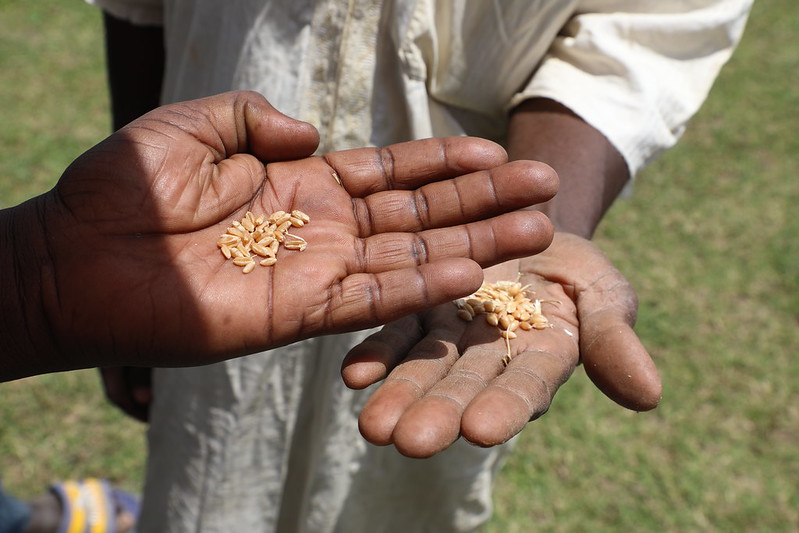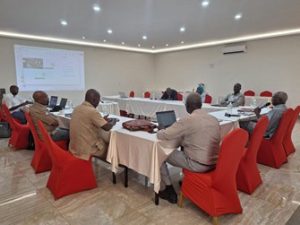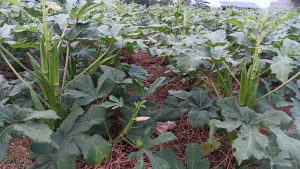TAAT holds regional workshop for Seed Actors in fragile states

With sights set on linking high-yielding, climate-resilient technologies to public and private sector partners and stakeholders in countries experiencing fragility, Technologies for African Agricultural Transformation (TAAT) has held a regional workshop for seed actors from Mali, South Sudan and Somalia.
The training, which held in Addis Ababa, Ethiopia, from 20-23 June 2023 with support from the Transition Support Facility of the African Development Bank, was organised in collaboration with the TAAT Wheat Compact led by the International Centre for Agriculture in the Dry Areas (ICARDA).
The workshop provided technical knowledge on on seed production and quality assurance to participants selected from the National Agricultural Research Systems (NARS) and the private sector of the respective countries.
The training brought together 22 participants, including representatives from private seed companies, seed producer cooperatives, agricultural research institutions, and academic institutions. Notably, 30% of the participants were women, and 33% were under 35.
The workshop emphasized the important role of Agricultural Small and Medium Enterprises (ASMEs) in delivering modern agricultural technologies to farmers for the purpose of transforming the agricultural sector.
The training covered technical aspects of seed production, planning, processing, storage, and quality assurance, employing various approaches, including presentations, interactive discussions, working group sessions, and field visits to ASMEs involved in seed production.
Participants appreciated the course content and delivery, rating it from very high to excellent. They pledged to apply the knowledge gained to expand their seed business operations within their respective countries and pass on the acquired knowledge to fellow members and farmers.


The workshop participants equally showed interest in organizing similar in-country training courses and requested technical and financial support to reach a broader audience. The upcoming second round of the regional course will focus on seed business management, business plan development, seed marketing, branding, and related topics.
Field visits were made to Burka Agricultural Development Private Limited Company-Burka PLC and Denkaka Megertu Seed Producers Cooperative-Denkak Megertu SPC.
Both Burka PLC and Denkaka Megertu SPC displayed exceptional dedication not only to rainfed seed production during the main season but also to off-season seed production of wheat, chickpea, and lentil. Their ability to diversify their production throughout the year provided the needed testament to the attendees on the proactive approach and commitment to meeting market demands.
The success and achievements of these private sector entities left a lasting impression, serving as a catalyst for inspiration of participants from Mali, Somalia and South Sudan.
Witnessing their accomplishments, participants say, has reinforced “their understanding of the immense potential that collaboration between SMEs and NARS can have in driving agricultural growth.”
“The experiences gained from these exemplary organizations provide valuable insights and learnings that will help our countries to invest more in seed production and contribute to the transformation of their agricultural sector,” they said.
The Transition Support Facility was established in 2008 (initially under the name Fragile States Facility) as an operationally autonomous entity within the African Development Bank (AfDB) Group. It was established to complement the Performance-Based Allocation (PBA) of resources that tend to be low relative to needs and legitimate demands from states affected by fragile and conflict-affected situations.
Since then, it has mobilized a total of over $3.7 billion in additional development finance for a set of low-income countries where fragile situations remain a challenge to sustainable and inclusive development.
It is a fast, simple and flexible disbursement mechanism designed to help countries consolidate peace, build resilient institutions, stabilise their economies and lay the foundations for inclusive growth.
Recent Stories
Related Stories
- South Sudan: TAAT holds High-level Consultative Workshop on Food Systems Transformation
- TAAT Renews commitment to transforming irrigation in Africa
- AFSTA 2025: TAAT advocates Innovative Seed System Models to unlock Opportunities for SMEs
- South Sudan: TAAT facilitates workshop on Strengthening Emergency Preparedness and Response to Food Crisis
- How TAAT is cultivating hope and uniting for Agricultural Transformation in South Sudan





